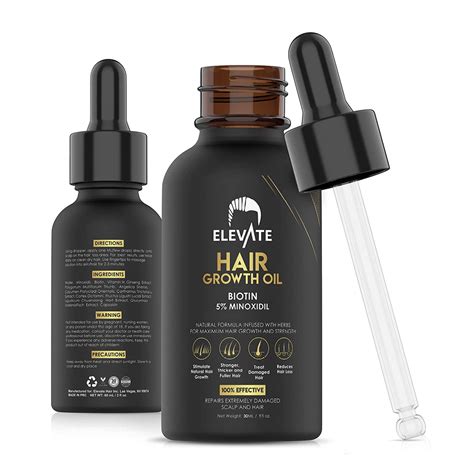Introduction: The Importance of Nourishing Your Hair
Dry, dull, and brittle hair are a common problem, affecting millions of people worldwide. This is especially frustrating for those who take pride in their appearance and want to maintain healthy, vibrant hair. The solution lies in turning to nature’s abundance of nutrients and remedies. Certain oils have been proven to promote hair growth, nourish hair follicles, and improve overall hair health. In this comprehensive article, we will delve into the world of hair oils and explore the 10 best oils for hair growth, empowering you with the knowledge to transform your locks.

1. Coconut Oil: The Versatile Hair Growth Stimulator
Coconut oil has been a staple in hair care regimes for centuries. Its rich composition of fatty acids, antioxidants, and antibacterial properties make it a true hair growth ally. Lauric acid, a dominant fatty acid in coconut oil, has been shown to penetrate deep into the hair shaft, providing nourishment from within. This helps strengthen hair, reduce breakage, and stimulate hair growth. Additionally, coconut oil’s antibacterial properties combat scalp infections that can hinder hair growth.
2. Argan Oil: The Liquid Gold for Hair Rejuvenation
Argan oil is a precious oil extracted from the kernels of Argania spinosa trees, native to Morocco. Its golden hue and nutty aroma have earned it the nickname “liquid gold.” Argan oil is renowned for its high concentration of antioxidants, vitamin E, and omega-3 and omega-6 fatty acids. These nutrients work in synergy to rejuvenate hair follicles, promoting hair growth, reducing dryness, and adding shine and softness to hair.
3. Castor Oil: The Thick, Viscous Hair Growth Booster
Castor oil, derived from the seeds of the castor oil plant, is known for its thick, viscous texture. It contains a unique fatty acid called ricinoleic acid, which has anti-inflammatory and antimicrobial properties. These properties help soothe scalp irritation, reduce dandruff, and promote hair growth. Castor oil also strengthens hair follicles, minimizing hair loss and brittle hair.
4. Jojoba Oil: The Plant-Based Hair Growth Regulator
Jojoba oil is derived from the seeds of the jojoba plant, native to the southwestern United States and Mexico. Its composition closely resembles the natural oil produced by the human scalp, known as sebum. This makes it an ideal hair oil, as it helps regulate sebum production, preventing oily hair and promoting healthy hair growth. Jojoba oil also contains antioxidants and vitamin E, which protect hair from environmental damage and promote stronger, more resilient hair.
5. Rosemary Essential Oil: The Hair Growth Stimulating Herb
Rosemary essential oil is extracted from the leaves of the rosemary plant. Its herbaceous aroma and stimulating properties have been used for centuries to promote hair growth. Rosemary oil contains carnosic acid, an antioxidant that has been shown to inhibit the breakdown of hair follicles, thus preventing hair loss and promoting thicker, fuller hair.
6. Peppermint Essential Oil: The Hair Growth Enhancer
Peppermint essential oil is extracted from the leaves of the peppermint plant. Its invigorating aroma and cooling properties have been found to stimulate hair growth. Peppermint oil contains menthol, a compound that increases blood flow to the scalp, promoting nutrient delivery to hair follicles. This increased blood flow creates an environment conducive to hair growth.
7. Lavender Essential Oil: The Hair Growth Calming Oil
Lavender essential oil is extracted from the flowers of the lavender plant. Its sweet, calming aroma has been used in aromatherapy for centuries to reduce stress and promote relaxation. Lavender oil contains linalool, a compound that has been shown to reduce inflammation and soothe irritated scalps. By creating a healthy scalp environment, lavender oil promotes hair growth and reduces hair loss.
8. Tea Tree Oil: The Hair Growth Antibacterial Agent
Tea tree oil is extracted from the leaves of the Melaleuca alternifolia tree, native to Australia. Its potent antibacterial and antifungal properties have earned it a place in traditional medicine for centuries. Tea tree oil helps combat scalp infections that can hinder hair growth, such as dandruff and scalp psoriasis. By eliminating these infections, tea tree oil creates a healthy environment for hair to grow and thrive.
9. Ylang-Ylang Essential Oil: The Hair Growth Aphrodisiac
Ylang-ylang essential oil is extracted from the flowers of the ylang-ylang tree, native to Southeast Asia. Its exotic, sweet aroma has been used in perfumery and aromatherapy for centuries. Ylang-ylang oil contains linalool and geraniol, compounds that have been shown to promote hair growth and reduce hair loss. Additionally, ylang-ylang oil balances the scalp’s sebum production, preventing oily hair and promoting a healthy scalp environment.
10. Black Seed Oil: The Hair Growth Miracle
Black seed oil is extracted from the seeds of the black cumin plant, native to South Asia. Its bitter taste and pungent aroma have been used in traditional medicine for centuries to treat various ailments. Black seed oil contains thymoquinone, a compound that has been shown to inhibit hair loss and promote hair growth. Additionally, black seed oil strengthens hair follicles, reducing breakage and split ends.
How to Use Hair Oils for Optimal Hair Growth
Incorporating hair oils into your hair care routine is a simple yet effective way to promote hair growth and improve overall hair health. Here is a step-by-step guide on how to use hair oils:
- Start with a small amount: Begin by applying a small amount of oil to your hair. You can gradually increase the amount as needed.
- Apply to damp hair: Damp hair is more receptive to oil absorption. Apply the oil to freshly washed and towel-dried hair.
- Massage into the scalp: Use your fingertips to gently massage the oil into your scalp. This will stimulate blood flow and allow the oil to penetrate the hair follicles.
- Distribute through the hair: Once the oil is applied to the scalp, use a wide-toothed comb or your fingers to distribute it evenly through the hair.
- Leave in for 30 minutes to overnight: Allow the oil to sit in your hair for at least 30 minutes or overnight. You can wrap your hair in a warm towel to enhance oil absorption.
- Rinse and wash: Rinse your hair thoroughly with warm water and wash with shampoo.
Tips for Selecting the Right Hair Oil
Choosing the right hair oil depends on your individual hair type and needs. Here are some tips to help you select the best oil for your hair:
- Consider your hair type: Fine hair benefits from lightweight oils like coconut oil or jojoba oil, while thick hair can tolerate heavier oils like castor oil or argan oil.
- Address specific hair concerns: If you suffer from dandruff, tea tree oil can help combat the infection. For dry hair, coconut oil or argan oil can provide intense nourishment.
- Do a patch test: Before applying any new hair oil to your entire head, do a patch test on a small area of skin to rule out any allergic reactions.
Benefits of Using Hair Oils for Hair Growth: Evidence-Based Findings
Numerous scientific studies have demonstrated the benefits of using hair oils for hair growth. Here are some key findings:
- Coconut Oil: A study published in the “Journal of Cosmetic Dermatology” found that applying coconut oil to hair damaged by chemical processing significantly improved hair protein content and reduced hair breakage.
- Argan Oil: A study published in the “Journal of Ethnopharmacology” found that argan oil extract stimulated hair growth in mice by promoting hair follicle proliferation.
- Castor Oil: A study published in the “International Journal of Molecular Sciences” found that ricinoleic acid, a fatty acid found in castor oil, promoted hair growth in human hair follicles.
- Jojoba Oil: A study published in the “Journal of Cosmetic Science” found that jojoba oil helped regulate sebum production and improved hair quality in individuals with dry hair.
- Rosemary Essential Oil: A study published in the “International Journal of Dermatology” found that applying rosemary oil to the scalp increased hair density and reduced hair loss.
Common Mistakes to Avoid When Using Hair Oils for Hair Growth
While using hair oils can be beneficial for hair growth, it is important to avoid common mistakes that can hinder your progress:
- Overuse: Using too much hair oil can weigh down your hair, making it look greasy and limp.
- Applying to dry hair: Applying hair oil to dry hair can prevent it from being absorbed properly.
- Leaving it on for too long: Leaving hair oil on for too long can clog hair follicles and lead to hair loss.
- Using the wrong type of oil: Choosing the wrong type of hair oil for your hair type can lead to ineffective results or even hair damage.
Conclusion: Embracing the Power of Hair Oils for Hair Growth
Incorporating hair oils into your hair care routine can be a transformative experience, leading to stronger, healthier, and more vibrant hair. The 10 best oils for hair growth, including coconut oil, argan oil, castor oil, jojoba oil, rosemary essential oil, peppermint essential oil, lavender essential oil, tea tree oil, ylang-ylang essential oil, and black seed oil, offer a range of benefits to nourish hair follicles, stimulate hair growth, and improve overall hair health. By understanding the specific properties and applications of each oil, you can make informed choices that will empower you to achieve your hair growth goals.
Remember, patience is key when it comes to hair growth. Regular use of hair oils, combined with a healthy diet, adequate sleep, and proper hair care practices, will gradually lead
